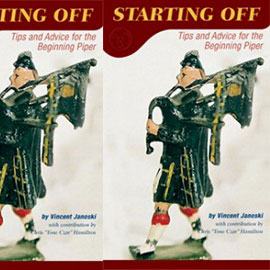The 3-Step Path to Better Bagpipe Goals: “Goal Chunking”
 The fall and winter months are the perfect time for setting musical goals and developing and building skills to improve your bagpiping.
The fall and winter months are the perfect time for setting musical goals and developing and building skills to improve your bagpiping.
Sometimes though, setting goals can be daunting and the day-to-day trappings of life distract us. We lose track and the work toward our goals, even if you eventually get there, seems never ending. Well, it can be, but you can be assured that satisfaction, greater confidence, and greater pleasure derived from your playing awaits you as your ultimate reward.
Most of us can come up with several things we would like to achieve with our bagpiping. Those “big goals” can be good motivators if they are always waiting for you. But more often than not, they will always be waiting for you and your progress toward them will seem slow. Why is this? It is because the goals themselves are perhaps too big and stand as an ineffective means to make true progress.
Goals are as effective only insofar as they are definable and measurable. Goals must be associated with specific actions if they are to be achieved at all and that is where things can get messy. You will need to break up bigger, overarching goals into discrete “chunks” with actions and measures for each. Goals, be they big or small, are achievable when you set criteria and deadlines for yourself. They are measurable when you define the steps and employ tools to critically assess your progress.
1. Identify and define your goal chunks. Examine your big goals and pull out the details to create short-term goal chunks. “Learn a new MSR” is an easy goal. But take a moment and think of all the actions required to learn a brand new MSR from scratch. Be specific. How many can you list? There are almost too many, which makes the task seem overwhelming. How would you know when you’ve achieved this goal? Your indicator of achievement is simply knowing the tunes I suppose, but is that all there is? Of course not. The simple goal “learn a new MSR” is too broad and ill-defined to be useful. I am sure you can create a long list of all the things that will be required of you to play each individual tune in that new MSR well. It is those things that are your goal chunks. Even the simple goal of “Learn XYZ tune” can be broken up into smaller bits. “Play XYZ tune with steady timing” is a smaller goal chunk that is measurable, but even still, may be too broad. If your chunk has too many actions associated with achieving it, then it is still too big and can be broken down further. “Improve timing of two-bar phrases in XYZ tune” is a smaller chunk in the same vein that narrows down to the simple action of pulling out a phrase and practicing with a metronome. XYZ tune may have a tricky bit of technique that may require you to work on the articulation of that technique. That is a goal chunk with clearly defined criteria and easily measurable with a “before” and “after” recording. Clearly define what must happen or be heard in order for you to say, “I have achieved my goal.”
2. Set deadlines. This deadline is a small period of time to achievement. Give yourself a day, a week, ten days, or a month. Heck, you can even give it a half-hour. The importance of the deadline is to focus your effort. As an experiment this fall, create one goal chunk and give it a week to achieve. Track your progress with notes or recordings. Make the work constant for that period. You might find that you did not meet your goal in your self-imposed deadline. Don’t worry. Create a new deadline and keep working. Keep in mind though, that long deadlines may mean that your “chunk” is still too broad and can be narrowed down further.
3. Measure your goal chunks. Measurement of your goal could take the form of comparison recordings at the start of the process and the end. It could be the objective feedback from a listener whose opinion you trust. Make a recording of the necessary playing before you work. At the deadline you set, make another recording and listen critically. (Develop your inner piping judge.) Think about the definitions and criteria you set at the start of the process. Did you meet them? How close are you? If there is more work to be done, you might have a chunk that is still too big and can be broken down more. Break down your chunk into a more refined piece and extend your deadline period. Measure again using your most recent recording as your “before” point. Keep at it until your goal is achieved.
The time frames and chunk definitions will be different for everyone. It really comes down to thinking hard about what you want to achieve with your bagpiping—and then getting down to work. That’s all there is, isn’t it? Sounds easy, yes? But breaking down your bagpiping efforts into manageable parts can indeed make it all that much easier.
 Pipehacker
Pipehacker








